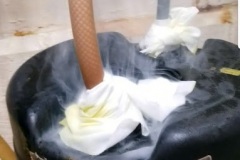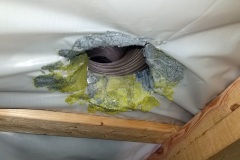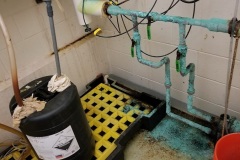At a Special Town Meeting on November 2, voters will be asked to approve a second large request for Water Department funding this year — and residents who use town water could see a rate hike approaching 50%.
This week’s move to borrow $967,000 and transfer another $340,000 from retained earnings comes eight months after $1.01 million in Water Department borrowing was approved at the Annual Town Meeting (ATM) last March. The resulting 25% rise in water rates came after several years with no increases, and the next rate hike (which won’t be known until after a public hearing has been scheduled) will be “significant,” Town Administrator Tim Higgins said.
The latest urgent need for borrowing is a result of several factors: not enough spending on preventive maintenance and upgrades in recent years, a series of chemical accidents and other events in recent months, and staff turnover combined with a tight labor market that have left the Water Department chronically short-handed and required expensive part-timers to fill the gaps.
While many officials are resigned to the new expenses, others in town — including several former Water Commission members and Water Department employees — say that some of the looming expenditures aren’t truly necessary right away, and that the sudden need for cash is due to mismanagement by department Superintendent MaryBeth Wiser.
The saga began with a routine inspection by the state Department of Environmental Protection in August 2018 that uncovered several problems. The report from the triennial inspection, which happened to occur a few months after Wiser was hired, took the Water Commission by surprise because it listed many more issues (27 deficiencies and 12 recommendations) than the previous inspection in 2015.
The two biggest items approved for bonding last March were required as a result of that 2018 inspection: $355,000 for safe chemical handling storage and ventilation upgrades, and $400,000 for chemical handling and ventilation compliance work at both the water treatment plant on Sandy Pond Road and the town well on Tower Road (see page 47 of the 2019 ATM warrant).
The November 2 bonding requests totaling $967,000 are:
- An additional $148,000 for the previously approved chemical handling and ventilation system, largely because the project scope has expended to include a chlorination system at the well
- A complete replacement of all 240 filtration modules in the treatment plant ($364,000)
- A new coagulation system at the treatment plant to combat a higher-then permitted level of disinfection byproducts in the treated water
- Another $125,000 on top of previous estimates for building a platform and catwalk to safely service the filter modules
Chemicals
As ordered by the DEP, engineers were already designing systems to provide more safety around the caustic chemicals used to treat the town’s water, but two unrelated chemical spills in the past year highlighted the deficiencies. In November 2018, rainwater seeped into a pipe connected to a barrel of hydrochloric acid used to wash the filters. The resulting chemical reaction produced an “off-gassing” of fumes that triggered a regional hazardous-materials response by firefighters and sent treatment plant operator Jeremy Bernard to the emergency room.
See photos by Jeremy Bernard of conditions at the water treatment plant
(click thumbnails for larger versions and captions)
That accident would not have happened if the barrels of chemicals were fitted with proper piping and airtight lids, Bernard said. In the past, much smaller off-gassing episodes that were undetectable by smell have resulted in repeated respiratory symptoms of water treatment plant staff, he added.
In addition to the added request for a new well chlorination system, two tanks and some piping were also tacked on to the previously planned work. “MaryBeth came to us and asked us if we could include those three things” as well fixing a defect that allowed a leak of spilled sodium hydroxide to spread under a containment wall, said Ryan Neyland of Tata and Howard, the Water Department’s engineering firm, at an October 29 Water Commission meeting.
The company has provided a host of consultation and design services as well as a staff member to work at the plant one day a week at a cost of about $1,000 a day. The department has needed that outside help because two treatment plant positions have been vacant since at least last spring, largely due to a statewide shortage of licensed water treatment operators. One person was offered a job but turned it down, and the town has raised the starting salaries in an attempt to attract more interest, Water Commissioner Ruth Ann Hendrickson said.
Meanwhile, the two remaining treatment plant staff members have been working on a schedule of 12 days on and two days off since February, “and we are beyond exhausted,” Bernard said. Their work includes responding to after-hours problems caused by power failures, partial system shutdowns and other issues.
Saturday’s funding request also includes $100,000 to handle a spill of potassium hydroxide at the well. About 300 gallons of the highly alkaline fluid leaked due to an equipment failure and then seeped out of the building into the ground through a cracked seam. The well was taken offline as a precaution and won’t be allowed back into service until repeated testing satisfies the DEP that the chemical didn’t seep down and contaminate the water, but that should happen “very soon,” Hendrickson said.
Filters
At the heart of the water treatment process are the filters, which must be washed in two different ways according to a schedule. They are supposed to last at least five years but could last “seven or even ten years if they’re kept in good condition and not stressed with poor water quality,” Neyland said, adding that Flint’s Pond has excellent quality. The filters are all showing signs of degradation, and Wiser has said that they are about nine years old and have reached the end of their useful life.
The town needs to appropriate money right away because the process of ordering and getting new filters shipped takes several months, and they should be installed before warm weather increases the amount of organic materials in the water and puts more strain on the filters, Wiser said.
However, others say the filters are actually not very old, and that much cheaper measures could significantly extend their life. In addition to the regular sanitizing washes (which they’re getting more and more frequently), they’re supposed to be cleaned with a hydrochloric acid solution every three months — but that hasn’t happened on schedule since the off-gassing incident. After the vapor leak, a temporary ventilation system made of wood and plastic sheeting was installed around the chemicals, but Bernard said he has refused on safety grounds to open any new barrels of hydrochloric acid until primary containment is established with an airtight lid.
“As soon as we can do an acid cleaning, we’ll see a dramatic improvement” in the performance of the filters, Bernard said. “I believe people who have been listening to MaryBeth will be surprised by how well things may operate once our cleaning system is made functional. To replace [the filters] now is like putting the cart before the horse. You wouldn’t put new tires on a car with two broken axles… I don’t want to see those filters going into the treatment plant until we see what the long-term plan is going to be.”
Bernard and former employees also said that most of the 240 filters are only about three years old. In 2016, the manufacturer gave the town more than 180 discontinued filters for free, and they’ve been installed a few at a time since then. Wiser told the board at its October 3 meeting that the department only received 100 free filters, and that any new filters installed alongside older ones would have to do double duty and would wear our faster as a result.
But Hendrickson disputed this view. “The best practice in this case is to really have them replaced all at the same time,” Hendrickson said. “By the time we can get new filters due to the long lead time, the upgraded chemical handling systems will be in place and all
the associated valves will have been replaced, so we are not ‘putting the cart before the horse’.”
Coagulation
Coagulation pretreatment involves adding a chemical such as alum to the water to make tiny particles clump together so they’re big enough to be caught by the filters (a step that also extends the life of the filters themselves). Residents received a notice on October 8 that Lincoln’s water had exceeded the maximum allowed proportion of trihalomethanes (TTHM) at one of two sampling locations. TTHM forms when chlorine-containing disinfectants that are added to the water to kill germs react with naturally occurring organic matter from decaying plant and animal products.
Officials aren’t sure why some TTHM levels were high in both 2018 and 2019, though warmer pond water due to climate change is probably a factor. Also, when the level rises, it inundates more leaves and animal products on the formerly dry shoreline, meaning the water needs more filtering and disinfection.
Water levels rise when the pond is replenished with rainfall, or when the dam that holds back the water is deliberately heightened, though this is very rarely done. Sometime in the past several months, Wiser told staff to temporarily raise the dam by adding boards to the top, causing the water to rise so much that it crept close to the pump house and also began seeping under the dam, which was upgraded in 2017.
No one is sure why the boards were added. Wiser referred requests for comment to Hendrickson, who said, “I haven’t been able to get a straight story.”
Management
Former Water Commissioners Bob Antia and Heather Ring echoed the sentiment that Wiser is not always forthcoming with clear explanations of why certain steps were taken or expenditures are necessary.
“When MaryBeth doesn’t want to answer a question, it takes a really long time to not answer the question, and by then you’re tired,” said Antia. He resigned partway through his second term on the commission because a change in his work hours made it impossible to attend the group’s daytime meetings.
Ring resigned earlier this month after only seven months in the commission because she was so disenchanted with Wiser. In a statement to the Lincoln Squirrel in Thursday, she wrote:
“Lincoln Water Superintendent MaryBeth Wiser started her job with a fully staffed department and level-funded budget. Preventative maintenance measures were not in place, and maintenance was reactive when equipment broke. It was soon evident water rates needed to increase to perform further reactive maintenance. Superintendent Wiser, while managing to perform reactive maintenance, continually fails to prioritize needs and create a long-term plan for maintaining Lincoln’s aging system. In addition, staff morale continued to degrade like our water system, and a hostile work environment festers. The department needs a leader who can lead them out of crisis mode and into the modern world.”
“She doesn’t have the knowledge she represents herself as having” about how the plant operates, Bernard said. “She uses the vocabulary well, and she comes off as being educated on the subject… but she gets her information from the engineers. They keep taking money and giving her suggestions.”
Bernard has complained repeatedly to Higgins and Assistant Town Administrator Mary Day about allegedly abusive conduct by Wiser and safety issues at the plant, “and their collective reactions have been ‘Do your job,’” he said. He acknowledged he has been cited several times by Wiser for insubordination and was accused by former Superintendent Greg Woods of harassment “because I wouldn’t drop the subject when he told me to” after Bernard raised concerns about operational or safety issues.
“They tell me I’m overreacting… but I have fought and fought to get the right things to happen up there,” he said.
But Bernard has not been the only employee to clash with Wiser. Since she was hired 19 months ago, a water treatment staff member and three administrative assistants have resigned. “I have not investigated this personally, but my experience in the private sector is that when you have a bunch of people leave like that, there’s probably an underlying cause,” Antia said.
Several of these former employees, who spoke to the Lincoln Squirrel on condition of anonymity due to fear of retaliation, agreed with Bernard’s views on Wiser.
“I really don’t think she knows how to run the treatment plant,” said one.
“The environment was extremely toxic and she was verbally abusive. I had no choice but to leave to save my health and my sanity,” said another.
In a statement emailed to the Lincoln Squirrel on Thursday, Bernard expanded on his comments:
“I make these statements in fear and expectation of retaliation. Due to the town administration’s repeated acknowledgment of how impressive it is that MaryBeth Wiser has received so much money from the Water Commission, I assume I will be fired for making these statements, but the people who pay for and drink the water should know…
“I have moral objections to the way money is being wasted in our department due to the lack of knowledge and understanding of our superintendent. I have always advocated for the needs of the department and the quality of the water in this town. And due to the over $0.5 million invested in me by the town of Lincoln over the past eight years, and the home I own and maintain with that funding, I feel obligated to try and address the real issues within our department. I have always stood up and addressed public and personnel safety issues and have been met with swift and irrational retaliation for it. I have no reason to expect differently now, but I have hope that the real problem will be addressed before MaryBeth Wiser is allowed to destroy another life and career of personnel under her control,” Bernard wrote.
As superintendent, former employees say Wiser has taken a markedly different approach from that of her predecessor. “Greg was a working superintendent; he got his hands in there and did whatever needed to be done,” said one. In contrast, Wiser has her staff do most of the operational work and relies much more heavily on outside engineering consultants, sources said.
When asked to describe Wiser’s management style, Hendrickson was diplomatic. “It’s not clear… who knows… it’s very hard to put your finger on that. I’m not there on a day-to-day basis,” she said.
Spending requests
The Water Commission has been taken aback by the recent spending requests. “It was a difficult situation. [Woods] never asked for more money by saying ‘I need this and that, or we need more maintenance.’ We wondered, how did this happen?” Hendrickson said. “Here we had Greg, who we all thought was wonderful, and then MaryBeth says “this is broken, this is broken and this is broken.’ It took a while for us to really believe that what she was saying was true.”
Reached by phone on Thursday, Woods declined comment on his or Wiser’s work as superintendent.
During the DEP inspection in 2018, several sources said, Wiser actually encouraged the inspector to find deficiencies. “I think she thought the sure-fire way to get money out of the Water Commission was having the DEP cite us and say we have to do something,” a former employee said. Water Department staff “were not trying to hide anything, but she was practically pointing stuff out. She’s addicted to spending money when it’s not hers, and she loves brand-new things.”
After the Lincoln Squirrel published a story on October 25 about the upcoming bonding request, an anonymous reader (later confirmed to be a former employee) commented underneath, “As long as the vampiric rapaciousness that has run rampant under her tenure is allowed to continue, more and more money will be requested, and Lincoln residents will be asked to pay up.”
The dollar amounts for some requests have also changed. Wiser told the commission in October 2018 that the total cost for the 240 filter modules would be about $192,000. At a meeting last week, she said the cost would be $325,000, while the motion at Saturday’s Town Meeting asks for $364,000.
According to the 2019 ATM warrant, the Water Department’s annual operating budget was $1.11 million in fiscal 2018 and $1.19 million in fiscal 2019. Figures from earlier this month show a budget of $1.37 million in fiscal 2020, while the initial request for fiscal 2021 (not yet voted on by the Water Commission) is $1.75 million, a 28% increase from the current year.
The future
Unfortunately, this year’s combined $2 million in bonding for the Water Department won’t mark the end of its financial needs. The Tower Road well is more than 40 years old, with reduced capacity and more frequent cleanings needed, and is slated to be replaced in the next couple of years. In fact, Wiser’s original request for capital spending in fiscal 2021 included $500,000 for a new well.
The water tank on Bedford Road is also showing signs of age, with a possible leak and a deteriorating concrete lid. The water treatment plant was “designed like a glove to fit around the equipment that’s there and was not designed with enhancements in mind,” Hendrickson said, and the pumping station next to Flint’s Pond is maxed out in terms of space as well. And then there are the miles of aging water mains all over town.
One bit of good news, however: in three years, the 20-year bond for construction of the treatment plant will be paid off, which will free up about $187,000 a year.
The Water Commissioners are frustrated at the slow pace of the the design, approval, and bidding process for getting work done, and they’re chagrined at having to repeatedly seek money for upgrades, Hendrickson said, but the alternatives — years of delay and millions of dollars for either an entirely new treatment plant or a possible alliance with the Massachusetts Water Resources Authority — aren’t necessarily more palatable. “But we’re all unanimous that the money we’re asking for is really needed or we wouldn’t be asking for it.”





Wow. I have just moved to Lincoln and thus can’t opine on the issues, but the report’s author has certainly done her homework and covered the bases of many, if not all relevant parties. I am a big fan of independent local media, so I’m aware that when a town loses its local news coverage, services decline and taxes rise. Reporting like this mitigates against that problem
I totally ditto that comment. I no longer live in town – but still love it – and reporting like this is essential to keep things livable (and lovable!) Thank you, Lincoln Squirrel!
Great coverage, Alice.
Thank you…I certainly will re-up this subscription!
I would like to know exactly who Ruth Ann Hendrickson is referring to when she said “But we’re all unanimous that the money we’re asking for is really needed…”. Who is “we”, exactly? The two brand new commissioners who were hastily sworn in after last two resigned? One of the problems with the water department is that the employees never had any regular contact with the commissioners; everything was funneled through the superintendent, which allowed the superintendent to control the narrative. The fact the Ruth Ann Hendrickson responded to a question about Wiser’s management style with “It’s not clear…who knows…It’s very hard to put your finger on that..I’m not there on a day-to day-basis”, is not only an embarrassing and shameful thing to admit, but also completely untrue, since a few employees did complain to the commissioners and administration. The department would have run a lot smoother if the commissioners bothered to get to know and speak with the people who actually did the work, and not just listen to some self-serving mouthpiece who evidently has a problem with keeping her stories straight.
I’m not sure why this Superintendent was hired in the first place when a simple Google search reveals much about her past work history. I also wonder why Wiser was and is allowed to continue in her position if she not only mismanages town funds but creates a hostile work environment. Surely the town is liable for retaining an abusive supervisor whose employees have to choose between their safety and their livelihood.
Wow! When we hired Greg Woods, I knew my job as a Water Commissioner was over. At least someone was smart enough to say that Greg was a hands on, do the job, superintendent and knew how to run the filtration plant. I know Andy Cole felt the same way about Greg. What fool brings DEP in and encourages them to find deficiencies. Wiser had to have oversold herself with the hiring committee. This is broken, that is broken, oh really, where was Wiser addressing the possible issues when they happened.
Wake up and fire her. The engineers are having a field day with Lincoln.
Someone should ask why she has a company car if she doesn’t do field work